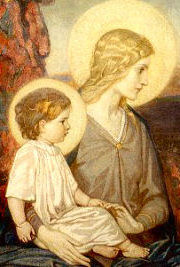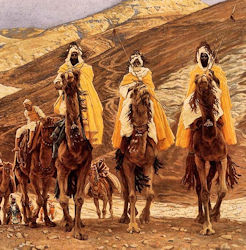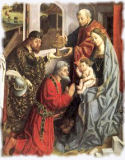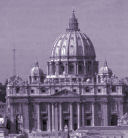» Enjoy our Liturgical Seasons series of e-books!
 Today the Church celebrates the Solemnity of the Epiphany of the Lord. "The Lord and ruler is coming; kingship is his, and government and power." With these words the Church proclaims that today's feast brings to a perfect fulfillment all the purposes of Advent. Epiphany, therefore, marks the liturgical zenith of the Advent-Christmas season. —Pius Parsch
Today the Church celebrates the Solemnity of the Epiphany of the Lord. "The Lord and ruler is coming; kingship is his, and government and power." With these words the Church proclaims that today's feast brings to a perfect fulfillment all the purposes of Advent. Epiphany, therefore, marks the liturgical zenith of the Advent-Christmas season. —Pius Parsch
The Solemnity of the Epiphany is celebrated either on January 6 or, according to the decision of the episcopal conference, on the Sunday between January 2 and January 8. The young Messiah is revealed as the light of the nations. Yet, as the antiphon for the Magnificat at Second Vespers reminds us, three mysteries are encompassed in this solemnity: the adoration of the Christ Child by the Magi, the Baptism of Christ and the wedding feast at Cana. Extra candles and/or lamps may be placed around the sanctuary and in other parts of the church to honor Christ revealed as the Light of the Gentiles (Ceremonial of Bishops). It is customary to replace the images of the shepherds at the crib with the three Magi and their gifts. —Ceremonies of the Liturgical Year, Msgr. Peter J. Elliott, Ignatius Press.
 The feast of the Epiphany, which was kept in the East and in certain Western Churches before being observed in Rome, seems to have been originally a feast of the nativity; January 6, for those churches where it was kept, was the equivalent of Christmas (December 25) in the Roman Church. The feast was introduced at Rome in the second half of the sixth century and became the complement and, so to say, the crown of the Christmas festival.
The feast of the Epiphany, which was kept in the East and in certain Western Churches before being observed in Rome, seems to have been originally a feast of the nativity; January 6, for those churches where it was kept, was the equivalent of Christmas (December 25) in the Roman Church. The feast was introduced at Rome in the second half of the sixth century and became the complement and, so to say, the crown of the Christmas festival.
Epiphany means manifestation. What the Church celebrates today is the manifestation of our Lord to the whole world; after being made known to the shepherds of Bethlehem He is revealed to the Magi who have come from the East to adore Him. Christian tradition has ever seen in the Magi the first fruits of the Gentiles; they lead in their wake all the peoples of the earth, and thus the Epiphany is an affirmation of universal salvation. St. Leo brings out this point admirably in a sermon, read at Matins, in which he shows in the adoration of the Magi the beginnings of Christian faith, the time when the great mass of the heathen sets off to follow the star which summons it to seek its Saviour.
That is the meaning, too, of the wonderful prophecy from Isaias which the liturgy appoints to be read in the first nocturn at Matins and at the Epistle of the Mass. This same thought of universal redemption the Church returns to as she sings, in the antiphon to the Magnificat at 2nd Vespers, applying the words to herself, of the union with Christ typified by the wedding feast at Cana, by the baptism of her children foreshadowed by that of Christ in the waters of the Jordan. Formerly the Epiphany was an additional day for solemn baptisms.
Station Church Information >>>
Solemnity of the Epiphany—Day Fifteen The Church extends itself on Epiphany to the homes of the faithful. The custom of blessing the home on this day probably originated from these words in the Gospel, "And entering into the house, they found the Child with Mary, His Mother, and falling down they adored Him." The priest blesses the house if he can be present, but if not, the father of the family may do so.
Mass Readings for the Solemnity of the Epiphany, Cycle A:
The Second Reading is taken from the Letter of St. Paul to the Ephesians 3:2-3; 5-6. St. Paul's thoughts in his prison in Rome are not for himself nor for the fate that awaits him. He is thinking instead of the mission Christ gave him, to evangelize the Gentile nations. He has done much already, and even in prison he does all he can to continue the good work. He writes to his Gentile converts from Rome, to remind them of their great privilege in being called to the Christian faith. They are now God's new Chosen People, they are now members of Christ's mystical body.
The Gospel of today's feast, is from the Gospel of Matthew 2:1-12. The Magi are the central personages in today's feast of Epiphany. They were pagans who did not know the true God of the Jews. Yet that true God revealed to them that the King he had promised to the Jews had come. The expected Prince was born. They came to Jerusalem, the capital of Judah, expecting, of course, to find the city and the whole country rejoicing. Instead they found suspicion and hatred in the reigning king—a hatred which in a few days turned to murder. Among the religious leaders they found knowledge of their past history, but utter indifference as regards the present and the future. These leaders knew the Messiah would be born in Bethlehem; they must have realized that the Magi were very sure of the truth revealed to them—they would not have come such a long journey on a "fool's errand." In spite of that, the thought of going to Bethlehem with the Magi never entered their minds. These were the leaders who some years later refused to listen to Christ and in spite of his miracles refused to admit his claim that he was not only the promised Messiah, but the true Son of God. These were men who rejected him because he had mercy on sinners, and spoke of a future life. What they wanted from their Messiah was political power and earthly freedom and prosperity. Like Herod they ended with murder—the crucifixion of the "King of the Jews." The pagan king was not much worse than the indifferent leaders of God's Chosen People. Let us resolve to make the Magi our models, to follow them to Bethlehem and offer Christ all that we have and are.
Reflection: The Feast of the Epiphany, Be Enlightened!
2. Arise, Jerusalem. Jerusalem, O Church, arise. "Thy heart shall wonder and be enlarged." The Church rejoices today as if she could not be satiated with beholding the glory of the Lord. It is as if she were reliving the experience on Mount Tabor with Peter and James and John. "Lord, it is good for us to be here" (Matt. 17:4). A holy enthusiasm floods the Church today. Many conditions of our times give the Church little cause for rejoicing, and tend rather to be very discouraging. In many places she is barely tolerated. Many refuse to listen to her or to be bound by her decrees. Many reject her teaching, her sacraments, her priesthood, and her authority over souls. Many demand that she conform herself to the spirit of the age and give up her dogma. Since she will not do that, she is rejected by many, and many wander away from her. Some attempt to arouse in the people a dislike for the Church. They ridicule her and seek to drag her down into the gutter. Today the Church has become a stumbling block for many. She has been appointed by the Lord as the means of salvation for all men and those very men reject her. Amid such contradiction and unbelief how can the Church still rejoice and show enthusiasm, sing her songs as she once did in the ages of faith? She can and does, for she knows that the Lord resides in her, protects her and guides her. He is her strength and her hope, and those who cling to her are filled with His spirit and His life. "For behold, darkness shall cover the earth and a mist the people, but the Lord shall rise upon thee and His glory shall be seen upon thee" (Epistle). This is the message of Epiphany. Epiphany reveals the nature and the mystery of the Church. She is not a mere human institution, for Christ, the incarnate Son of God, lives within her. It is in her, and nowhere else, that He has revealed Himself. Whoever seeks Christ must seek Him at Bethlehem, in His Church. It is in this Church that He lives and through her that He works. The more humble and believing the man who comes to her, the more certain he is of a share in Christ and redemption. The Church is indeed the manifestation of Christ. And entering into the house they found the child with Mary Hi Mother." It is through Mary that the wise men from the east find the child and are permitted to caress Him. We can go to Christ only through Mary, only through the Church. Christ and His redemption are possible only through her. "For behold, darkness shall cover the earth, and a mist the people, but the Lord shall rise upon thee [like the sun] and His glory shall be seen upon thee. And the Gentiles shall walk in thy light and kings in the brightness of thy rising. Lift up thy eyes round about and see. All these are gathered together and they come to thee." In you and in you alone will men find Christ and salvation. "Behold I am with you all days, even to the consummation of the world" (Matt. 28:20). With faith and confidence the Church celebrates the manifestation of Christ to the world, without anxiety or concern. 3. "His glory shall be seen upon thee." He displays His glory in the Church, "the glory as it were of the only begotten of the Father, full of grace and truth" (John 1:14). As the sun rises in the morning to dispel the darkness, so Christ the Spiritual Sun arises in His Church to banish the darkness of error and uncertainty. Christ, the Sun of Truth and Life, illuminates His Church. "I am the light of the world; he that followeth me walketh not in darkness but shall have the light of life" (John 8:12). Today we share the confidence of the Church and her liturgy. Just as we share the pain and sorrow of the Church, so too we share her unshakeable confidence. "The Lord shall rise upon thee and His glory shall be seen upon thee" (Epistle). "Ecce advenit Dominus—Behold the Lord, the Ruler is come" (Introit). "God is in the midst thereof, it shall not be moved" (Ps. 45:6). Now the true nature of the Church is revealed. Christ lives in her.
Solemnity of the Epiphany of the Lord,
The Station is in the Basilica of St. Peter in the Vatican, in keeping with the dignity of the festival of the Epiphany. Epiphany means manifestation. It is the mystery of Christmas, the manifestation of Christ to the world. It is no longer only to the Jews that He is shown; in the person of the three Wise Men it is to all people that He stand revealed as the light of nations. The original basilica was built by Constantine in 323 over the place where St. Peter was buried. For more on San Pietro in Vaticano, see: For further information on the Station Churches, see The Stational Church.![]()
 Epiphany is a large celebration, especially in Spanish speaking countries. Things look different around the household: the infant Jesus in the manger now has a small gold crown and is wearing regal robes. The figures of the wise men have reached Bethlehem, completing the nativity scene.
Epiphany is a large celebration, especially in Spanish speaking countries. Things look different around the household: the infant Jesus in the manger now has a small gold crown and is wearing regal robes. The figures of the wise men have reached Bethlehem, completing the nativity scene.
![]()
The First Reading is taken from the Book of the Prophet Isaiah 60:1-6. The prophet is trying to cheer the exiles by foretelling the glorious future of the new Jerusalem which is not yet rebuilt. The special radiance of God will illuminate it. Gentiles will bring their riches to it. From East and West peoples will flock to it. The Feast of the Epiphany is the feast which commemorates the manifestation of God to the Gentiles. This manifestation began when the Wise Men from the East came to Bethlehem to pay their respects and offer their gifts to the newly-born king of the Jews. Though the words of Isaiah were not understood by his hearers as referring to this event, it was only in the coming of the Magi, to welcome Christ, that they were really fulfilled.
—Adapted from The Sunday Readings by Fr. Kevin O'Sullivan, O.F.M.![]()
Christmas brought us a new light. As the sun after dawn climbs to the zenith, so in the sacred liturgy in the time after Christmas the spiritual Sun, Christ, rises higher and begins to enlighten and bless the world. Christ resides in His Church.
—Excerpted from The Light of the World, Volume One by Benedict Baur, O.S.B.
Station with San Pietro in Vaticano (St. Peter's in the Vatican):






